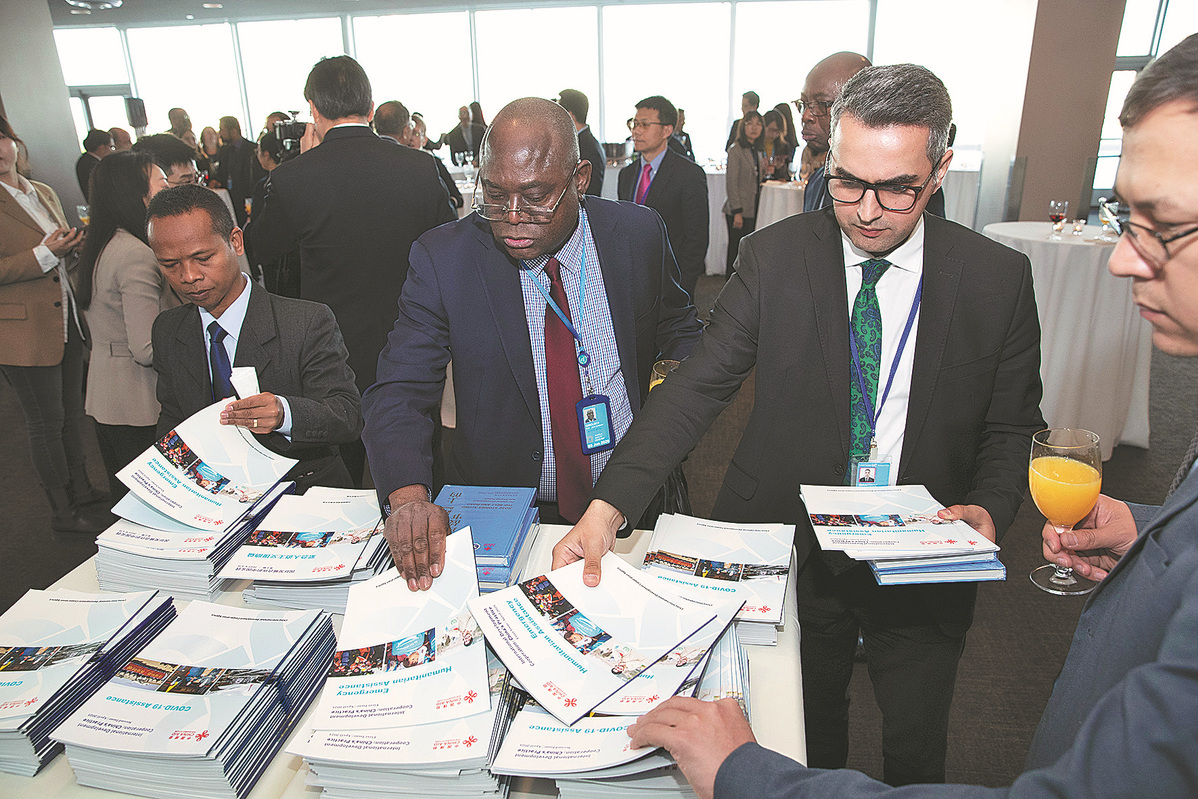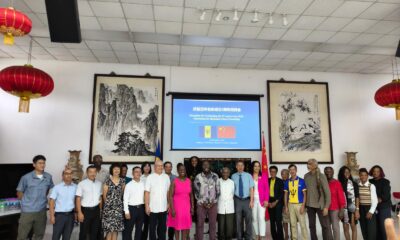Article from China Daily
President Xi Jinping is attending the 31st APEC Economic Leaders’ Meeting in Lima, Peru, where leaders from across the Asia-Pacific have convened to chart strategies for shaping the region’s future.APEC gatherings, renowned for blending economic discussions with cultural exchanges, often feature leaders donning local attire for the iconic “family photo”. This no-tie tradition is seen as a way to cut down on the formality that high-level meetings usually involve.
In these meetings, Xi’s remarks showcase not only his eloquence but also his wit, vividly conveying his vision for Asia-Pacific cooperation. Over the years, his incisive words and catchphrases have offered fresh perspectives on advancing regional growth and fostering deeper collaboration among APEC members.
On growth
During the 2016 APEC gathering, also held in Lima, Xi used an analogy to describe the relationship between China and the wider Asia-Pacific region, comparing it to sweet potatoes, a food native to Latin America.
He explained that while the vines of sweet potatoes may stretch in all directions, they all grow out of their roots. “Similarly, no matter what level of development it may reach, China, with its roots in the Asia-Pacific, will always contribute to the region’s development and prosperity.”That metaphor holds even truer today.Since joining APEC in 1991, China has become a key trading partner and export market for the majority of APEC members. According to China Customs, China’s trade with APEC economies reached a historic high, surpassing 21 trillion yuan ($2.92 trillion) in the first 10 months this year, marking a 5.7 percent increase from the previous year and accounting for 59.1 percent of China’s total trade.
In its efforts to promote free and open trade and investment in the Asia-Pacific and beyond, China has reduced its overall tariff level to 7.3 percent.”China cannot develop in isolation from the Asia-Pacific while the Asia-Pacific cannot prosper without China,” the Chinese leader made these remarks when he debuted at the APEC stage in Bali, Indonesia, in 2013, highlighting the interconnected growth of the region.Connectivity stands out as one key theme of Xi’s vision for Asia-Pacific development.
He once invoked a concept from traditional Chinese medicine to illustrate APEC cooperation: when there is free flow, there is no pain; when there is pain, there is no free flow. “Connectivity makes the economic arteries of the Asia-Pacific flow more smoothly,” he explained.During his 2013 trip to Indonesia, Xi proposed the 21st Century Maritime Silk Road, a pivotal component of the Belt and Road Initiative, and proposed plans for establishing the Asian Infrastructure Investment Bank to support the BRI.
To date, more than half of APEC’s 21 economies have engaged in Belt and Road cooperation, with signature projects like the Jakarta-Bandung High-Speed Railway in Indonesia and Chancay Port in Peru aiming to help strengthen trade networks and drive growth across the region.”
President Xi has put forward a series of proposals and initiatives to enhance Asia-Pacific regional cooperation, and the BRI is a major one to promote regional comprehensive connectivity,” said Liu Chenyang, director of the APEC study center at Tianjin-based Nankai University.”
These efforts led by President Xi have also shown the world China’s determination to take root in the Asia-Pacific and benefit the region in the long run,” Liu said.
While hosting the 2014 APEC meeting by Yanqi Lake in Beijing’s northern suburbs, Xi compared the 21 APEC economies to 21 swan geese.The lake got its beautiful Chinese name because the migrant swan geese would flock there for rest each spring and autumn. In Chinese culture, swan geese symbolize faithfulness, resilience and determination, flying in unison toward a shared destination despite great distances.”
We are meeting here at Yanqi Lake to enhance cooperation and embark on a new flight to shape a new vision for the development of the Asia-Pacific region,” he said. “A lone goose cannot make a formation.”As a steadfast champion for unity, Xi called on APEC economies to stay committed to mutually beneficial cooperation and fully leverage each other’s strengths to promote development for all.
“We should replace the ‘winner-take-all’ mentality with an all-win approach and work together for great development and prosperity of our region,” he noted.Founded in 1989, APEC was designed to foster economic growth and facilitate free trade and investment across the Asia-Pacific region. Throughout the years, thanks to the joint efforts of its members, the Asia-Pacific region has served as a vital engine of the world economy, driving what Xi has called “the Asia-Pacific miracle”.
The latest IMF data show the region contributes approximately 60 percent to global economic growth.The APEC economies, covering several continents and home to one-third of the world’s population, vary significantly in their development paths and economic conditions.
Acknowledging the differences and divergences among those in the region, Xi emphasized, “Those who cherish the same ideals and follow the same path can be partners, and so can those who seek common ground while reserving differences.”In 2014, under Xi’s chairmanship, APEC economies endorsed a road-map to advance the Free Trade Area of the Asia-Pacific, initially proposed in 2006 in Hanoi, Vietnam. This endorsement was widely viewed as a milestone, marking the official start of efforts to transform a broad vision into concrete actions aimed at elevating Asia-Pacific regional economic integration to a new level.Sharing Xi’s vision, Montri Mahaplerkpong, executive board member of the Federation of Thai Industries, said, “Adhering to the objective of driving APEC together, whether in big, small or medium-sized economies, we have plenty of room in this world to move the economy forward together, as long as we have the will to make it better.”
“I believe all 21 APEC member economies could do hand-in-hand collaboration by seeking common ground while shelving differences,” said Montri.On shared future“I was looking at the vast ocean when I boarded the ship, and it struck me that we are all indeed fellow passengers in the same boat,” Xi said while addressing the 2018 APEC CEO Summit hosted at a distinctive setting — onboard the giant cruise Pacific Explorer in Port Moresby, Papua New Guinea.”
As we brave the rough waters of the global economy and confront the many risks and challenges, it is all too befitting that we have come together on this ship to chart the course for future development and cooperation,” he noted. APEC has faced unprecedented challenges in recent years, from trade frictions to geopolitical tensions. Against this backdrop, Xi has consistently championed genuine multilateralism and warned against antagonism and confrontation.
“The Asia-Pacific is no one’s backyard and should not become an arena for big power contest,” he emphasized in the 2022 Bangkok meeting.During the 30th APEC Economic Leaders’ Meeting held in San Francisco last year, Xi posed a critical question: “Where will Asia-Pacific cooperation be headed in the next 30 years?” And he has provided an answer with Chinese insights — build an Asia-Pacific community with a shared future.”Community” has always been the keyword of Xi’s foreign policy. At his APEC debut in 2013, Xi urged member economies to strengthen “the sense of community of common destiny”.
Five years later in Port Moresby, he advocated for jointly building “a community with a shared future in the Asia-Pacific” to address common challenges.In 2020, as the world grappled with the COVID-19 pandemic and its economic fallout, Xi, while attending the annual APEC gathering via video link, elaborated on his vision to build an Asia-Pacific community with a shared future featuring openness and inclusiveness, innovation-driven growth, greater connectivity and mutually beneficial cooperation.
The 2020 meeting saw APEC members adopt the Putrajaya Vision 2040 as the guiding framework for future work, calling for the creation of an open, dynamic, resilient and peaceful Asia-Pacific community.As Xi prepares to join other Asia-Pacific leaders for discussions under the theme of “Empower. Include. Grow,” observers have set their expectations for the ongoing annual meeting in Lima.
“The role of APEC in facilitating dialogue among political and economic leaders is more crucial than ever at this time of growing protectionism and economic decoupling,” said Hans Hendrischke, professor of Chinese business and management at the University of Sydney Business School.
China has always been active in pushing emerging market economies and developing countries in the Asia-Pacific region to realize more efficient development, said Dora Isabel Gonzalez, a researcher at the Faculty of Higher Studies of the National Autonomous University of Mexico in Acatlan.
“I believe President Xi’s trip to Peru will strongly promote economic, trade and investment cooperation and sustainable development in the Asia-Pacific region and even globally,” said Gonzalez.


 Local3 weeks ago
Local3 weeks ago
 Tourism2 weeks ago
Tourism2 weeks ago
 Sports2 weeks ago
Sports2 weeks ago
 Features2 weeks ago
Features2 weeks ago
 Entertainment4 weeks ago
Entertainment4 weeks ago
 Business1 week ago
Business1 week ago
 Business3 weeks ago
Business3 weeks ago
 Local2 weeks ago
Local2 weeks ago


















